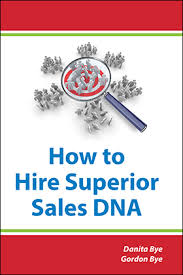 Too often business owners and sales executives find that newly hired salespeople fail to live up to their expectations even when these salespeople endured a rigorous interview process, and in many cases, they receive specific skills training after they begin their jobs. They know what they are supposed to do, but they can’t seem to pull it off; at least not to the level at they were expected to.
Too often business owners and sales executives find that newly hired salespeople fail to live up to their expectations even when these salespeople endured a rigorous interview process, and in many cases, they receive specific skills training after they begin their jobs. They know what they are supposed to do, but they can’t seem to pull it off; at least not to the level at they were expected to.
So why do they fail? It’s often because they lack the crucial elements for success. Or it’s because they lack the specific mental abilities, beliefs and habits needed to execute the skills they have been taught. And why doesn’t this come out in the interview process? It’s because experienced salespeople know the right answers to an interviewers questions and they are able to charm someone into liking them. Even the best interviewer finds it difficult to uncover the hidden weaknesses that will impede a salesperson’s performance. The solution is to test a sales candidate prior to hiring using a rigorous, scientifically proven, psychometric instrument that is directly connected to a candidate’s specific job profile.
Psychometric Testing
First, you need to understand what a psychometric test is and is not. It is not a personality test, such as DISC, the Meyers-Briggs assessment or Minnesota Multiphasic Personality Inventory (MMPI). Although these assessments can be helpful in terms of understanding how an employee is likely to behave in specific situations and how well they will work with their fellow employees, they are not predictive of whether a person can and will sell.
A psychometric test used in the context of hiring must be predictive. When a well-developed, validated psychometric assessment is integrated into the sales hiring process, it provides an objective decision-making tool and the likelihood of finding a good sales candidate increases dramatically. The right sales candidate assessment can calculate a candidate’s fitness for a particular role far better than any subjective assessment or interview ever will.
The test must be scientifically sound and sales-specific. There are many firms that offer this type of testing, but very few that have the predictive validity and proven results for hiring salespeople. Salespeople are different. Choose a firm that has partnered with statisticians and psychologists to develop reliable assessments that are specific to the sales arena. Reputable firms also will ensure that their tests fully comply with Equal Employment Opportunity laws and case precedents.
In addition, make sure that the assessment is tailored to fit the position you are hoping to fill. An assessment developed for an inside sales position will differ from one created for a strategic account manager or for a business development specialist.
Traits versus Skills
When implementing psychometric testing in a sales hiring process, it’s important to understand the differences between traits and skills. Traits are innate capabilities or strengths that make up a salesperson’s DNA. While skills can be improved through training, traits require more than training. Traits require a concentrated effort over an extended period of time. Sometimes it takes a life-altering event to get someone to change.
For example, almost everyone would agree that a salesperson must be motivated enough to accomplish the objectives set forth in his or her job profile. However, a person’s level of motivation is not a skill that can be trained. An individual’s motivation level is an inherent trait that already exists in varying degrees from person-to-person. An organization or sales manager’s ability to influence this trait is limited.
This is why the job profile must deal in traits, and it must be wholly different from the job description or the list of job skills necessary for the role. Hire for traits, and train for skills. It is very important to understand that salespeople with the right mix of traits or strengths but few skills will always outperform salespeople with good skills but a limited number of strengths.
The psychometric assessment you use must measure the traits that are required to execute a specific job profile. The question is not so much whether a candidate has the requisite skills but whether they can execute these skills when performing the duties required by the job.
Hire Slowly, Fire Quickly
How often do sales managers discover that their new hires are inadequate only after months of training? Psychometric testing helps eliminate these costly mistakes. Sales managers should hire slowly and fire quickly. Unfortunately, most sales managers do the opposite. They hire quickly and spend a multitude of resources attempting to train people who lack the traits needed for their roles. Consider the costs of training versus the costs of using a psychometric test. If you haven’t made a hiring mistake without one you are either clairvoyant or you just got lucky. It will happen to eventually.

